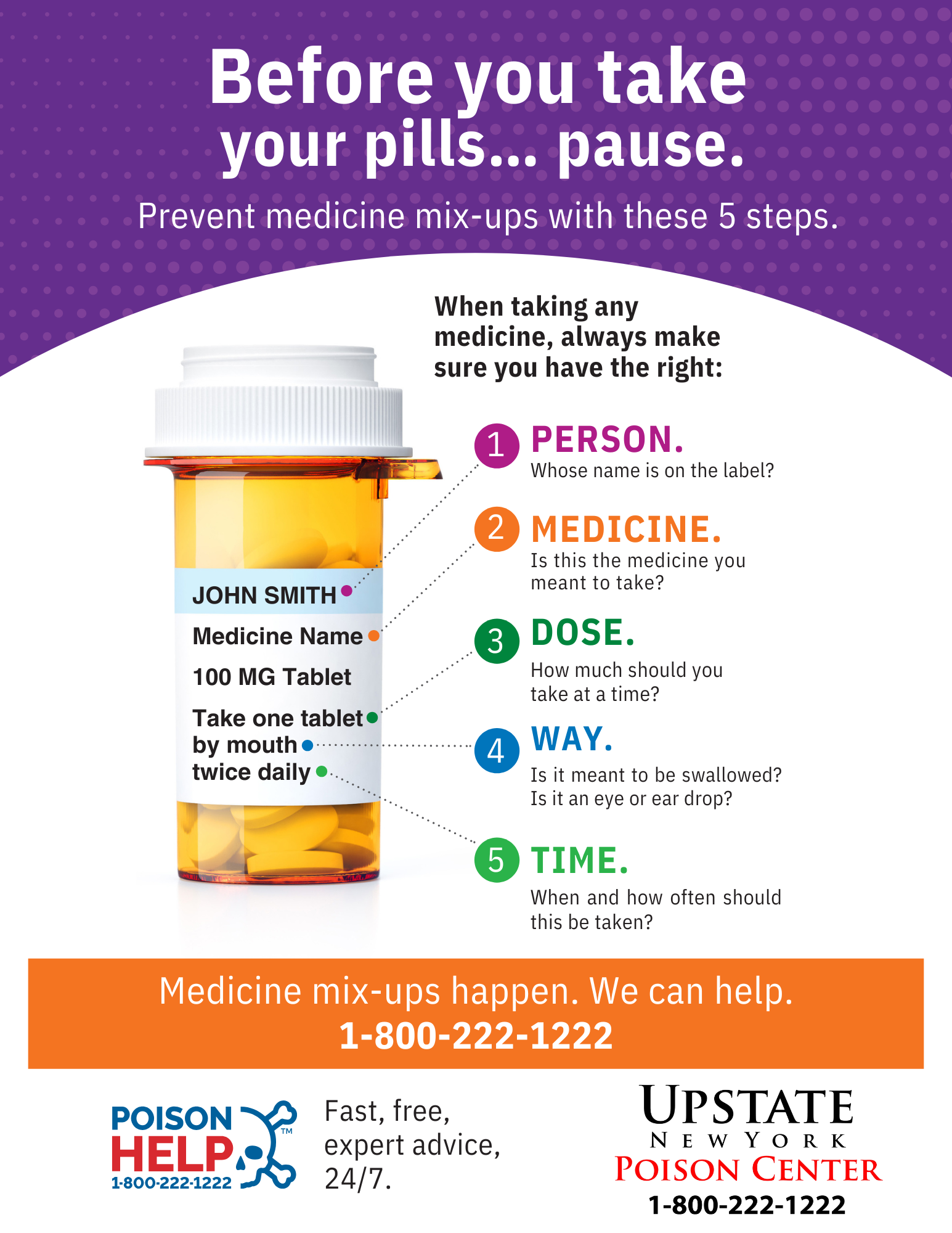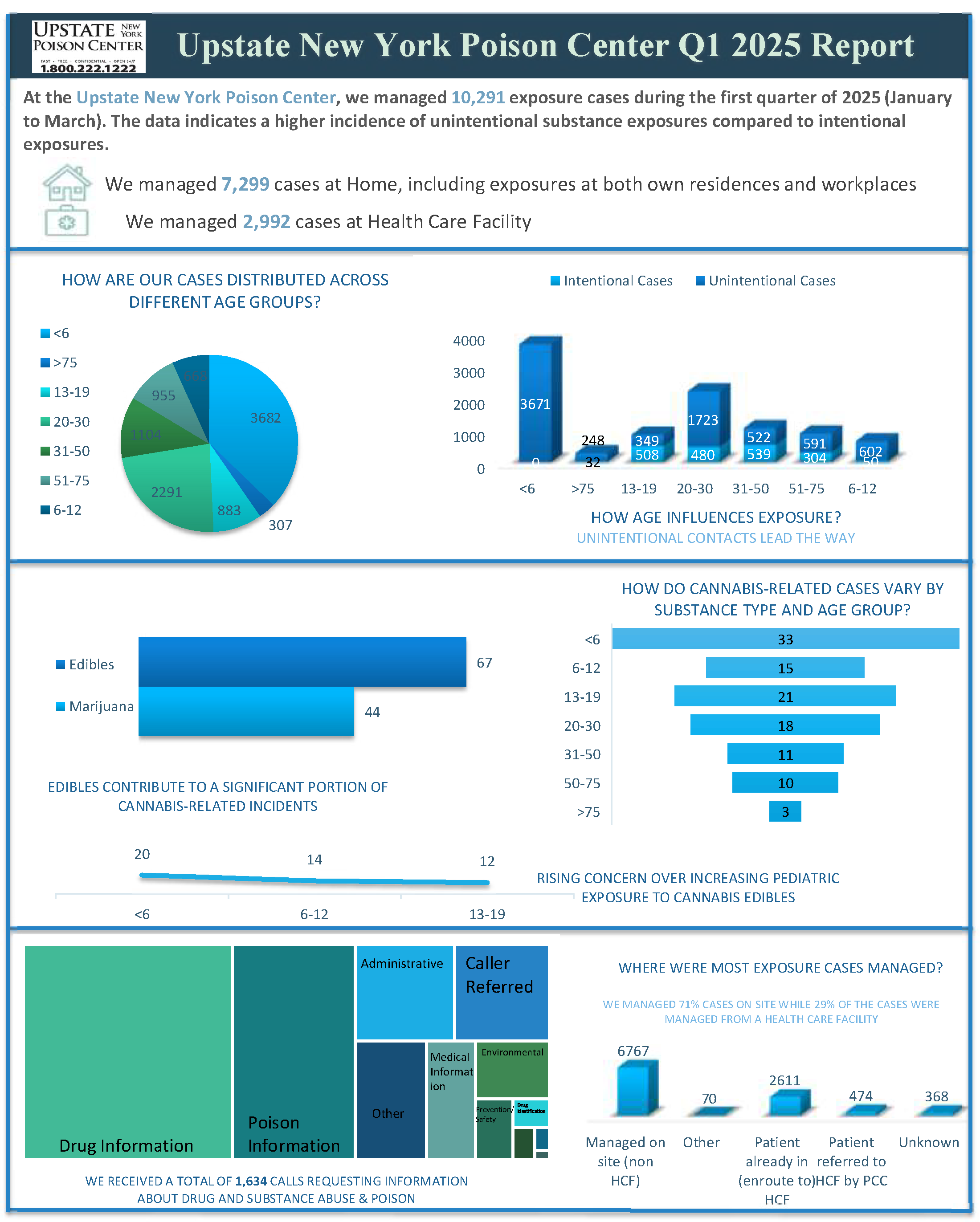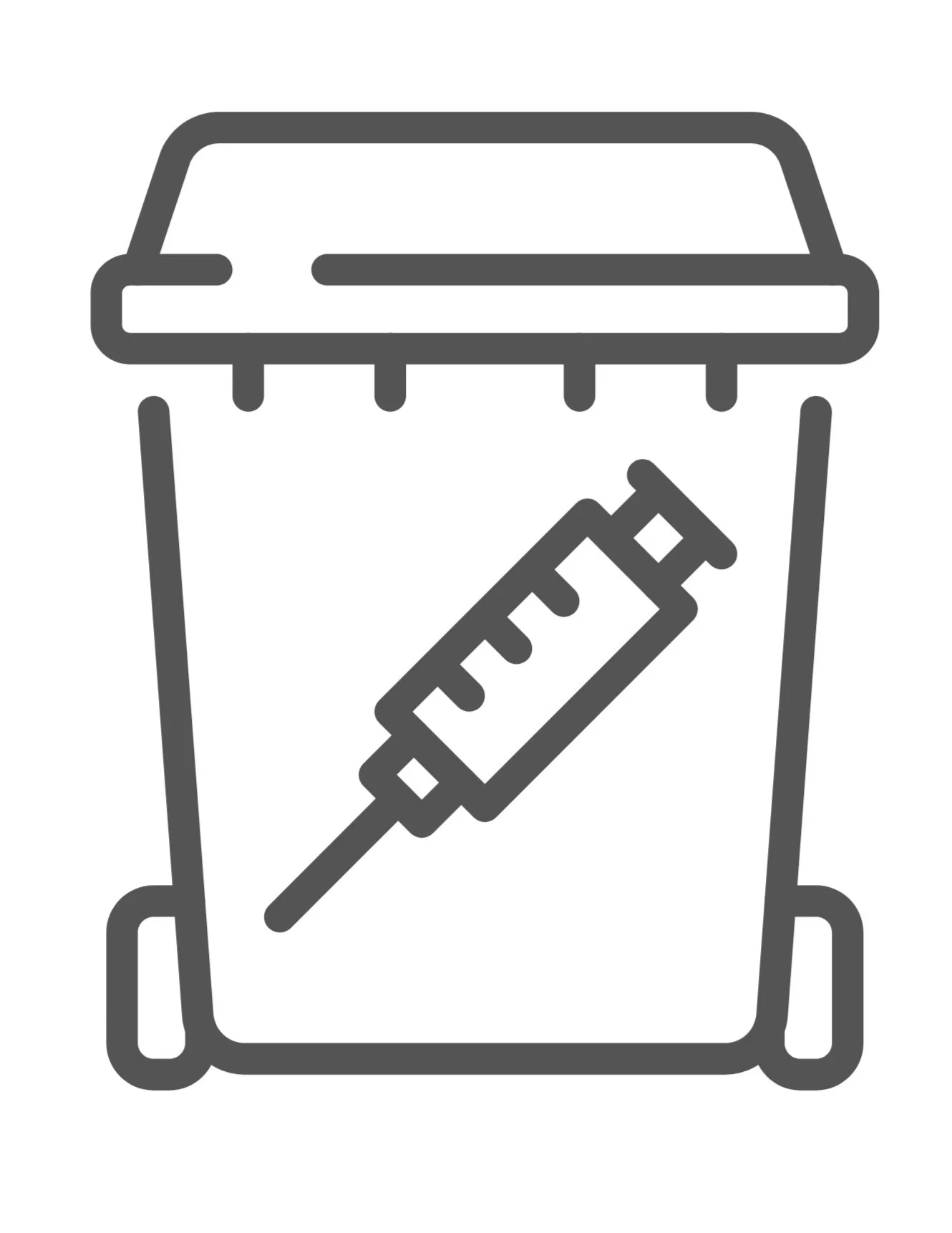Medication Safety & Disposal
Medication safety and disposal are crucial for protecting public health and the environment.
Proper disposal of medications prevents accidental ingestion by children, pets or visitors, while limiting environmental contamination, and preventing misuse or abuse.
By following guidelines for safe storage and disposal, individuals can contribute to a healthier community and a cleaner ecosystem.
Store Drugs Out Of Reach
The New York Poison Center managed 10,291 exposure cases in the 1st quarter of 2025
71% were managed on-site (e.g., at home or workplace), with the remaining 29% at health care facilities
A majority of cases were unintentional exposures among children under 6
1,634 information calls related to drugs, poison, environmental concerns, and prevention
Cannabis-related exposures from edibles, continue to be a concern; they are actively tracking these cases and focusing on education efforts that reduce unintentional poisonings
Medication Disposal Locations
Drop off Medications at any of these locations all year long.
-
16 Railroad Ave, Cairo, NY 12413
Open: 8am – 12am, Whenever an officer is on duty
Call to drop off: 518-622-2324
-
77 Main Street, Chatham
Call CC Sheriff, ask for Chatham drop box
(518)828-3344
-
119 Mansion Street, Coxsackie, NY
Open: 8am-12am
518-731-8121
-
85 Industrial Tract, Hudson, NY 12534
Open 24/7
ph: 518-828-3344
-
159 Jefferson Heights #D102
Catskill, NY 12414
M-F 8am-5pm, Sat 9am-2pm
518-943-1715
-
Crossroad at Route 22 and Route 23, Hillsdale, NY 12529
Open 24/7
ph: 518-828-3344
-
45 Haverly Drive, Coxsackie, NY 12192
9am-5pm
518-943-3300
-
71 Prospect Ave, Hudson, NY 12534
Open 24/7
-
7309 NY Route 81
East Durham, NY 12423
Call prior to drop off
518-731-6310
-
2967 Route 9, Valatie, NY 12184
Open 24/7
518-758-8800
-
34 Hope Plaza
West Coxsackie, NY 12192
M-F 9am-5pm, Sat 9am-3pm, Sun 9am-1pm
518-731-4800
-
107 Union Street, Hudson, NY 12534
Call first
518-828-3388
-
4852 State Route 81
Greenville, NY 12083
M-F 9am-7pm, Sat/Sun 9am-3pm
518-966-4800
-
371 NY-296, Hensonville, NY
9am – 3pm Daily
Call to drop off: 518-734-3030
-
61 ST NY 296 Windham, NY 12439
M-F 9am-6pm, Sat 9am-2pm
518-734-3033
Sharps Disposal Kiosk Locations
Drop off used or unwanted needles & syringes in containers up to 1 quart only
-
32 NY-82, Hudson
SHARPS ACCEPTED
KIOSK LOCATED OUTSIDE
24/7
-
2967 US-9, Valatie
SHARPS ACCEPTED
KIOSK LOCTED OUTSDE
24/7
-
107 Union Street, Hudson
SHARPS ACCEPTED
KIOSK LOCATED INSIDE 24/7
Drug Take Back Day Locations
Support DEA Drug Take-Back Day twice a year in April and October
-
77 Main St, Chatham, NY 12037
-
85 Industrial Tract, Hudson, NY 12534
-
701 Union St, Hudson, NY 12534
-
Held at Hannaford 223 Main St, Cairo, NY 12413 & CVS 7600 NY-32, Cairo, NY 12413
-
119 Mansion St., Coxsackie, NY 12501
-
45 Haverly Mem Dr, Coxsackie, NY 12051
-
61 ST NY-296, Windham, NY 12496
Medication Safety Tips
Provided courtesy of SafeKids.org
-
Keep medicine up and away, out of children’s reach and sight even medicine you take every day. Kids are naturally curious and can easily get into things, like medicine, if they are kept in places within their reach. Put all medicines and vitamins at or above counter height where kids can’t reach or see them.
Consider places where kids get into medicine. Kids get into medicine in all sorts of places, like in purses and nightstands. Place bags and briefcases on high shelves or hang them on hooks, out of children’s reach and sight.
Remember products you may not think about as medicine. Health products such as vitamins, diaper rash creams and even eye drops can be harmful if kids get into them. Store these items out of reach and sight of children, just as you would over-the-counter and prescription medicines
Choose child-resistant packaging whenever possible. Keeping medicine in a child-resistant container is important, but child resistant does not mean child-proof. With a little time and persistence, some children may still be able to get into child-resistant containers. If you are using pill boxes or other containers that are not child-resistant, it’s even more important to store these out of children’s reach and sight.
-
Read the label and know what's in the medicine. Check the active ingredients listed on the label and make sure you don’t give your child more than one medicine with the same active ingredient.
Follow the dosing directions on the medicine label. Even if you have used the medicine before, sometimes the directions about how much medicine to give change.
Use the dosing device that comes with the medicine. A teaspoon or tablespoon used for cooking won't measure the same amount as the dosing device.
Write clear instructions for caregivers about your child’s medicine. When other caregivers are giving your child medicine, they need to know what medicine to give, how much to give and when to give it.
-
Clean out unused and expired medicines in your home. Reduce the risk of kids getting into medicine by getting rid of unused or expired medicine. Many communities have a medicine take-back program. This is an easy way to get rid of your unused or expired medicine.
Get rid of medicine safely. Pour the medicine into a sealable plastic bag and add water to dissolve the medicine. Add kitty litter, sawdust or coffee grounds to the plastic bag to make it less appealing for children or pets before throwing it away. Check the Food and Drug Administration (FDA) recommendations for medicines that should be flushed down the toilet.
-
Teach your child that medicine should always be given by an adult. It's important for kids to know that they should not take medicine on their own. Parents and caregivers can help make sure they are taking it correctly.
Don't refer to medicine as candy. While saying medicine is candy may make it easier to get younger children to take medicine, it may encourage them to try it on their own.
Model responsible medicine use. Make sure to store medicine out of reach of children, read drug facts and prescription labels before taking medicine and follow the dosing instructions.
Teach older children how to take medicine responsibly. Need tips on how to teach older children about medicine safety? Check out the Scholastic OTC Medicine Safety Program for more information on this topic.
-
Save the Poison Help number in your phone and post it visibly at home: 1-800-222-1222. Specialists at poison control centers provide free, confidential, expert medical advice 24 hours a day. They can answer questions about how to give or take medicine and help with poison emergencies.
-
Share medicine safety information with family and friends. Teach other caregivers such as family members, babysitters and friends about medicine safety and make sure they know the Poison Help number. For more poison prevention information, visit the American Association of Poison Control Centers.




